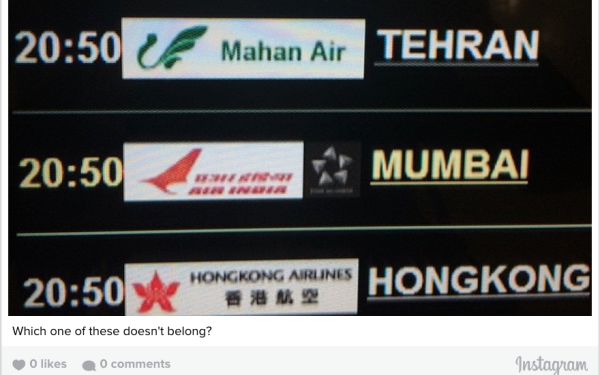OFAC Reminds Us of the Risks in the JCPOA’s Foreign Subsidiary Provision
Last week, the Office of Foreign Assets Control (“OFAC”) provided everyone with an important reminder that the foreign subsidiary license mentioned in the Joint Comprehensive Plan of Action (“JCPOA”) is not a panacea. In March, Schlumberger Oilfield Holdings, Ltd. (“SOHL”), a wholly-owned foreign subsidiary of Houston-based oilfield services company Schlumberger Ltd., agreed to plead guilty for violating U.S. sanctions on Iran and Sudan. While OFAC considered SOHL $232 million penalty sufficient, in issuing a Finding of Violation to Schlumberger Oilfield Holdings, Ltd. (“SOHL”), the agency reemphasized that just because certain allowances exist in the letter of U.S. sanctions laws, does not mean that they can be easily taken advantage of.
Schlumberger’s conduct occurred during a time when foreign subsidiaries of U.S. companies were allowed to do business with Iran. However, because of the continued prohibitions on the activities of U.S. persons, foreign subsidiaries dealing with Iran needed to be firewalled from the parent or from individuals considered to be U.S. persons as defined by 31 C.F.R. § 560.314. The export of U.S.-origin goods or technology to Iran also required a license from OFAC.
The reason that the Department of Justice and OFAC were able to attach liability to SOHL, which is incorporated in the British Virgin Islands, is because the firewall failed, or rather was deliberately broken. According to OFAC, between 2004 and 2010, SOHL was working “with and through Schlumberger’s [U.S.-based] “Drilling and Measurements” business segment (“D&M”)” in furtherance of activity that violated U.S. sanctions. This included:
(1) systematically approving and disguising capital expenditure requests from operations in Iran and Sudan for the manufacture of new tools and for certain expenditures;
(2) directing and overseeing the transfer of oilfield equipment from projects in non-sanctioned counties to projects in Iran and Sudan;
(3) making and implementing business
decisions specifically concerning projects in Iran and Sudan; and
(4) providing certain technical services in order to troubleshoot mechanical failures and to sustain sophisticated oilfield services equipment in Iran and Sudan.
By including D&M in the decision-making, SOHL opened itself up to liability under a host of sanctions provisions from both the Iran and Sudan sanctions programs.
The JCPOA does appear to offer a glimmer of hope to U.S. firms hoping to cash in on post-deal Iran. Beginning in late 2012, even foreign subsidiaries of U.S. companies were prohibited from dealing with Iran. This change was the result of the Iran Threat Reduction and Syria Human Rights Act (“TRA”), which led to the introduction of 31 C.F.R. § 560.215. This provision extends liability under the Iranian Transactions and Sanctions Regulations (“ITSR”) to foreign companies that are owned or controlled by U.S. Persons.
However, under § 5.1.2 Annex II of the JCPOA, the U.S. commits to
License non-U.S. entities that are owned or controlled by a U.S. person to engage in activities with Iran that are consistent with this JCPOA.
It seems logical that this will take the form of a General License and will somewhat roll back § 560.215, though the section will probably remain on the books.
Authorizing foreign subsidiaries to start dealing with Iran again is certainly an interesting opportunity for U.S. multinationals. But unless the general license deals with parent company/U.S. person liability, the risk of a Schlumberger-style violation remains. While technically possible, fully walling off a foreign subsidiary’s Iran operations is difficult from a practical perspective.
There are also facilitation issues to consider. Because existing policies are structured to comply with §560.215, will U.S. persons, whether legal counsel or management, be authorized to propose and implement policy changes in order to allow a foreign subsidiary to deal with Iran? This would seem to be a case of facilitation under § 560.208 as interpreted by § 560.417. While some of this may be worked out under a future General License, they are issues OFAC should be thinking about.
(Many thanks to Cristina Brayton-Lewis, Kerry Contini, and Alexandre Lamy for the discussion that led to this piece.)




2 Comments
Good post, Sam. Wondering if you could give one of the other reasons that ring-fencing foreign subsidiaries from their U.S. parent company is so difficult? Is it solely because of the “facilitation” ambiguity, or are there other hurdles to clear, as well?
Colby,
To answer your question – it’s a combination of factors. 1) It’s hard not to have at least some U.S. person involvement when the parent company is based in the United States 2) many foreign subs still rely on expertise, support, or technology from the parent to engage in normal business operations. This also works in reverse – see this penalty http://www.treasury.gov/resource-center/sanctions/CivPen/Documents/20141029_bupa.pdf where are U.S. sub of a foreign parent was performing “back office functions” for a UK parent. 3) At some level, decision-making for a foreign wholly owned sub is still done by the parent’s management, so it’s hard to wall off anything Iran-related completely. Not impossible, but difficult.
Comments are closed.